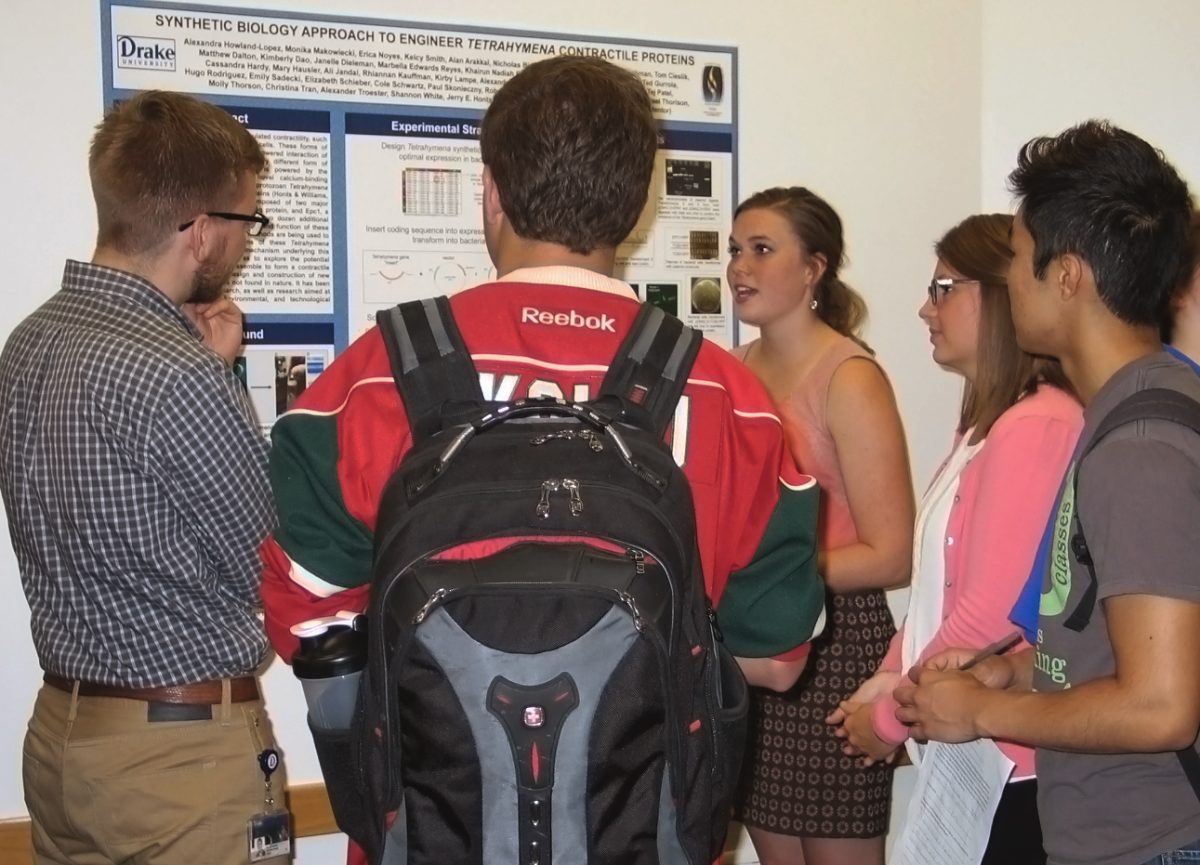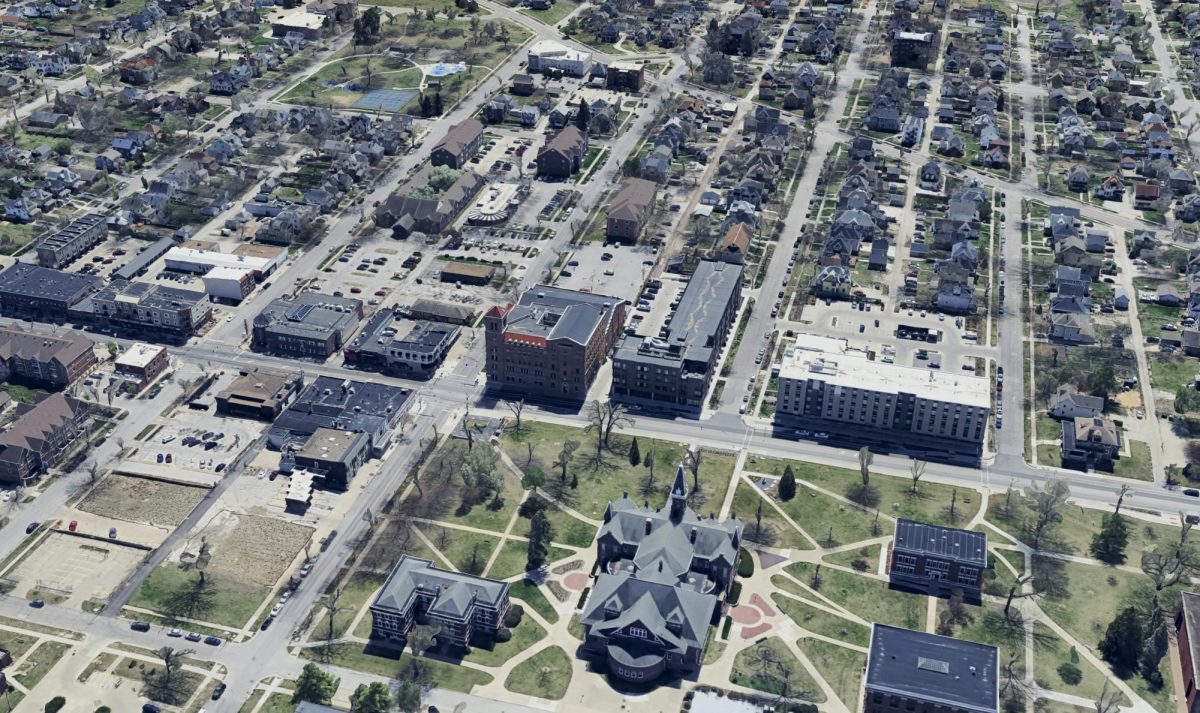Each year, the Drake Undergraduate Science Collaborative Institute hosts the Drake University Conference on Undergraduate Research in the Sciences as a way of showcasing the research being done by undergraduate students and their faculty mentors. This year, the conference is being held on April 10 in Upper Olmsted.
During the event, student researchers participate in poster sessions, in which they make professional posters, present their research and have the opportunity to attend a keynote address. This year, the address will be delivered by Dr. William Humphrey, a Drake alum who graduated with degrees in physics, math, and computer science. He is currently Chief Technology Officer at Numerix, a software company that specializes in market risk assessment. The address he will deliver at the conference is titled Physics in Finance – Scientific Computer Modeling: Tools and Trends in Financial Derivative Analytics.
Karis Tuve, a senior studying neuroscience with a minor in psychology, is one of many students who will be presenting their work at the conference.
Tuve works with Professor Vincent van der Vinne to research how short light pulses affect the circadian rhythms of mice. Tuve said these types of studies are common in the field of chronobiology, which is her area of study.
The posters that students create offer a formal synopsis of their research, and conference attendees have the ability to walk around and ask students about the research.
Dr. Heidi Sleister, a professor of biology at Drake and director of DUCURS, wants people outside of the immediate science community at Drake to know that students have the opportunity to do meaningful work in their areas of interest.
“I want [people] to know that Drake students have this opportunity to do research that is authentic,” Sleister said. “Students are literally the leaders on these research projects.”
DUCURS is meant to replicate professional science conferences.
“It’s a way for students to develop some of the professional skills that they may need in scientific careers,” said Dr. Meredith Luttrell, a professor of kinesiology and faculty mentor at Drake. “It’s also a celebration of the work that our undergraduate students have put into developing these scientific skills.”
Luttrell listed developing and testing scientific hypotheses, applying experimental methods, putting together results and disseminating those results as scientific skills that students gain from participating in research and presenting at DUCURS.
Sydney Dvorak, a senior majoring in biochemistry, cell, and molecular biology and law, politics, and society who has presented at various other science conferences, said that DUCURS requires students to present information differently than they would at other science conferences, which are often based on specific fields.
“It’s a great experience to practice your presentation skills,” Dvorak said. “I think my favorite part about DUCURS is being able to take my research and make it applicable to the general public. DUCURS forces you to think about how your research actually applies to the world and how you can make it interesting to understand.”
Dvorak’s research involves work on the pyrolysis of polymers and on plant hemoglobin proteins in the fields of analytical chemistry and biochemistry. But outside of her own research, Dvorak said she’s excited to see some of the environmental science projects.
“There’s a lot of really cool research the Environmental Science Department is doing right now on water quality with nitrate and bacterial levels and PFAS,” Dvorak said. “That’s always really cool to learn about, and that’s my little area of interest.”
In the future, Dvorak hopes to go into public and environmental health to work on improving water and soil quality. However, she also sees a future for herself in disseminating scientific knowledge. She pointed to the current news media and believes that there’s a huge need for scientific communication.
“Communicating science is becoming more and more important,” Dvorak said. “A lot of things are not fully understood. People don’t necessarily understand that there is always going to be uncertainty in science.”
Dvorak hopes that majoring in two different disciplines will help her bridge the gap between the scientific community and the general public.
“There’s enough really smart people doing really smart things in the research realm, but there’s not enough people taking that research and making it actually communicable to the people who could and should be using it,” she said.
Luttrell said one of her favorite parts of the conference is seeing what other faculty and their students are working on. She also enjoys hearing students share their research.
“It’s really exciting when students find something that they’re really interested in and can talk really passionately and knowledgeably about,” Luttrell said. “And it reinforces the importance of what I’m doing here at Drake as a faculty member.”
Luttrell is working with students on human subjects research that implements a six-week resistance training protocol that influences muscle strength, range of motion and balance in string musicians at Drake. She is also working with students on research dealing with computational modeling to simulate the effects of artificial gravity on the cardiovascular system.
Dvorak encouraged underclassmen to attend the conference and check out the projects they are interested in.
“Seek out those professors and be like, ‘Hey, I saw you’re doing this research, and I’d love to be a part of it if you have space for me,” Dvorak advised.
Luttrell said that DUCURS is inspiring for her and helps her imagine a positive future for the broader scientific community.
“It reassures me that whatever area of science they’re going to be working in is going to be in good hands,” Luttrell said. “They [the students] have the critical thinking and problem-solving skills to be successful in whatever field or discipline they choose.”
Griff II will attend the conference from 2:40 p.m. to 3:00 p.m.







